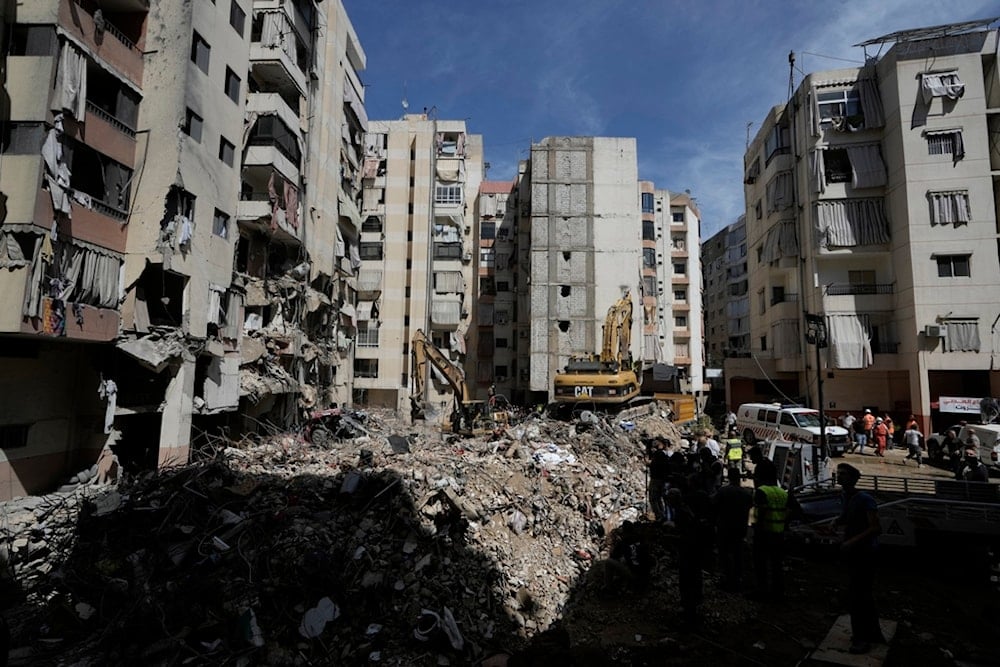Hezbollah mourns martyred Southern Front commander Ali Karaki
The Islamic Resistance in Lebanon mourns martyred senior commander Hajj Ali Karaki (Abu al-Fadl) after he was assassinated alongside Sayyed Hassan Nasrallah.
-

Emergency workers clear the rubble at the site of Friday's Israeli strike in Beirut's Southern Suburb, Sunday, September 22, 2024. (AP)
The Islamic Resistance in Lebanon - Hezbollah announced in a statement on Sunday the martyrdom of commander Hajj Ali Karaki (Abu al-Fadl) and a group of his comrades alongside Secretary-General Sayyed Hassan Nasrallah in a brutal Israeli airstrike on the Haret Hreik area in Beirut's Southern Suburb.
Hajj Abu al-Fadl’s legacy stretches back to the early days of the Israeli invasion of southern Lebanon in 1982, the Islamic Resistance announced, revealing that he took command of the Islamic Resistance fighters and played a pivotal role in every battle against the Israeli occupation.
His dedication to the path of Resistance culminated in his historic role in the liberation of southern Lebanon in 2000. His courage and leadership shone brightly again during Lebanon's victory in July 2006, when Hezbollah stood firm against the Israeli assault.
Abu al-Fadl was personally and directly responsible for commanding the southern front, overseeing all its axes and units, from October 8, 2023, until his martyrdom.
The Israeli occupation had previously attempted to assassinate Hajj Karaki, but it failed resoundingly when it attacked a civilian residential building under the pretext that he was in it. "The claims of the Zionist enemy regarding the assassination of brother Ali Karaki are false [...] the commander is alive and well, and he was transported to a safe place," Hezbollah said at the time.
The Israeli occupation forces have killed dozens of people in the Southern Suburb of Beirut alleging they were targeting Resistance commanders and Hezbollah "military sites".
Who was martyr commander Hajj Ali Karaki
Born in Msaytbeh on May 10, 1962, and originally from Ain Bouswar in South Lebanon, martyred commander Hajj Ali Karaki was among the founding members of Islamic activism in Beirut and a key leader in the resistance against the Israeli invasion of the city in 1982.
He played a major role in planning and overseeing numerous martyrdom operations, including the operation carried out by Ahmad Qasir. Following "Israel's" withdrawal in 1985, he helped establish resistance formations in the southern border area.
Karaki held the military leadership of the southern region until 1996, where he planned, supervised, and directly led numerous pivotal operations against Israeli forces during the occupation, ultimately contributing to the liberation of South Lebanon in 2000. He also played a crucial role in leading the Resistance during "Israel's" wars on Lebanon in 1993, 1996, and 2006.
From 2006 until his martyrdom, he commanded the Sayyed al-Shuhada complex, overseeing all its formations and units. He was a member of Hezbollah’s Central Shura Council and the Jihadi Council since it was founded. Since 2008, he served as a trusted jihadist aide to the Secretary-General. A key architect of military operations, he was instrumental in planning and directing major campaigns, including those targeting extremist groups, demonstrating his tactical expertise and leadership in safeguarding Lebanon's resistance efforts.
He planned and oversaw military operations for the Sayyed al-Shuhada complex on the Lebanese front since the beginning of Operation Al-Aqsa Flood.

 3 Min Read
3 Min Read








